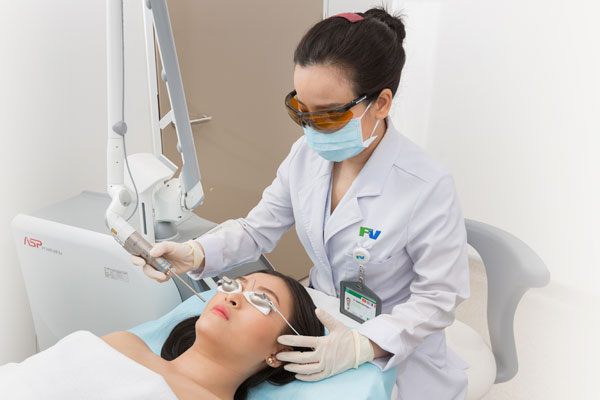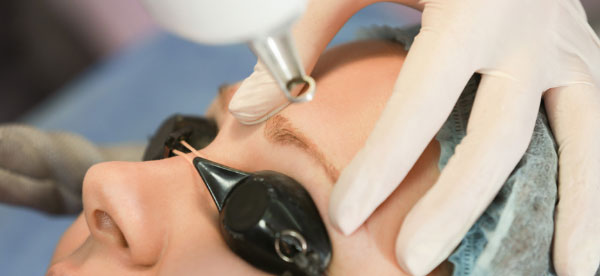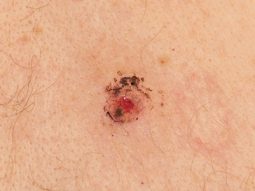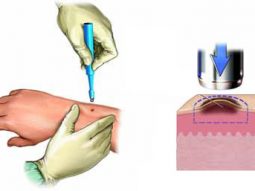Lasers are a simple, fast, effective, non-invasive and safe tool for removing a wide variety of benign pigmented lesions.
HOW DOES IT WORK?
Laser removal of pigmented lesions works by destroying the pigment in the skin without the need for excision.
The Fotona StarWalker® laser machine works by delivering high energy light pulses (“Q-switching”) using two wavelengths, one (532 nm) that can remove superficial lesions such as freckles, and the other one (1064 nm) that is effective on deeper lesions. The light pulses break up pigmented lesions into small particles that are then removed by the body’s own immune system.

WHAT PIGMENTED LESIONS CAN BE TREATED?
Solar lentigines (sun-induced age spots)
Benign, small, brown macules that often develop in adults on sun exposed areas (face, V of chest, hands, forearms and shin). When they are not too numerous, 1-2 sessions are usually enough to erase them. Before performing laser treatment the skin must be checked by a dermatologist to rule out any malignant or premalignant lesions that may look like solar lentigines.
Ephelides (freckles)
They are small brown macules that appear on sun-exposed areas usually during the summer months. Unlike solar lentigines, they generally present in early childhood. When they are not too numerous, 1-2 sessions are usually enough to erase them but recurrence is common.
Lentigines
These small dark brown macules usually appear during childhood. They usually disappear after 1-2 sessions of laser. When they are numerous, the dermatologist must verify that they are not part of a multisystem disorder.
Café-Au-Lait Macules (CALMs)
They are sharply defined, round to oval, homogenous macules or patches varying in size from two mm to 20 cm. There are found in up to 30 % of normal children. Numerous CALMs may be a sign of systemic disorders. Clearance of small CALMs needs 2-3 sessions. Large lesions are more difficult to treat and sometimes recur after several years.
Melasma
The melasma is a common pigmentary condition characterised by brown patches on the sun-exposed areas of the face, and most commonly occurs in women. Although many treatment modalities have been studied, there is no cure, and recurrences are inevitable. Strict sun protection and the avoidance of other triggers are essential.
Laser treatment is best reserved for carefully selected, treatment-resistant cases in conjunction with topical therapy. To avoid recurrence, after improvement of melasma, regular sessions are required (but no more than every two weeks because too frequent treatments carry the risk of hypopigmentation).
Becker’s nevus
This large brown patch appears during late childhood, usually on the trunk. Many sessions of laser are required to improve the lesion. As Becker’s nevus are often hairy, hair removal laser is sometimes required after clearance of pigmentation. Recurrence is possible.
Melanocytic nevi (moles)
Treating nevi with laser in patients with a familial or personal history of melanoma and dysplastic nevi is no recommended.
When necessary, melanocytic nevi should be removed using excision with histologic examination. In cosmetically-sensitive skin areas laser can be used after careful dermoscopic examination by an experienced dermatologist to rule out malignancy. Usually, flat lesions resolve completely (1-2 sessions), whereas compound nevi demonstrate only partial response to laser therapy. Recurrence of pigmentation is possible.
Nevus of Ota and nevus of Ito
Developing at birth or in the teen years, nevus of Ota presents on the face in a unilateral trigeminal nerve distribution as a blue-black, brown, or grey patch. It typically involves the peri-orbital region, the temple, the forehead, the malar area and the nose. Nevus of Ito is a similar lesion but is present on the shoulder.
Many sessions of laser at 3-6 months intervals are required to improve these lesions.
Hori’s nevus
Also called acquired bilateral nevus of Ota-like macules, it develops on the face as acquired bilateral blue–grey macules. Several sessions of laser, at 1-3 months intervals, are necessary to lighten the pigmentation.
HOW TO PREPARE MY SKIN BEFORE LASER TREATMENT?
- Avoid sun exposure to the treatment area, and do not use UV tanning beds at all for four weeks before treatment.
- Use a broad-spectrum sunblock with an SPF 50+ several times every day.
- Do not use any topical products that cause photosensitivity (e.g. hydroxy acids, salicylic acid, retinols, and benzoyl peroxide) in the treatment areas for three days before treatment. Use a gentle cleanser and lotion on treated areas.
- If you have received any procedures in the treatment areas, such as Botox®, dermal fillers, laser or spa services, please speak to your doctor to ensure that treatment may still be performed.
- If you are taking (or recently took) any medications, including antibiotics, inform your doctor prior to your appointment.
- Let your doctor know if you have a history of herpes infection on the treatment areas. You may need a preventive treatment.
WHAT TO EXPECT DURING TREATMENT?
- You will be required to wear protective eyewear.
- Most patients experience little discomfort while receiving this laser treatment. In children and sensitive persons numbing cream (EMLA®) may be apply two hours before the procedure under an occlusive dressing.
- The treatment can be performed in as little as 15 minutes, depending on the treatment area.
ARE THEY ANY SIDE-EFFECTS?
Side-effects from laser treatment are usually minor and include:
- Thin scab onto the skin, which disappears within a week;
- Mild bruising;
- Post inflammatory hyperpigmentation, more common in people with darker skin. It usually disappears after several months;
- Rarely hypopigmentation, more common in people with darker skin;
- Exceptionally scarring.

HOW MANY LASER TREATMENTS ARE NEEDED?
- Your treatment plan will depend on many factors such as the location, depth, size and type of pigmentation. Some lesions will require several treatments for optimal results, where some can be resolved in a single treatment.
- On average, patients will need 2-3 sessions for complete removal.
- The frequency of your pigmentation removal appointments will be based on clinical judgment. For most patients, treatment will be performed every 4 – 8 weeks.
WHEN WILL I SEE THE RESULTS?
- Most patients will see results after just one treatment. These results will be evident in about 4 weeks, but it can take up to 8 weeks for the full result.

ARE THE RESULTS PERMANENT?
- Pigmented lesions that have been removed will not return after your laser treatments.
- However, various factors such as aging, changes in hormone levels or UV exposure can stimulate new hyperpigmentation. Laser pigmentation removal treatments do not prevent new hyperpigmentation from occurring.
HOW TO TAKE CARE OF MY SKIN AFTER TREATMENT?
- After a laser treatment, there is immediate whitening of the treated area, and then the area treated may look red or inflamed for the next 24-48 hours. Many patients then develop blisters or scabs within 24-48 hours, which may last for 1-2 weeks. There may be some minor bleeding but this will heal by itself and should not cause any problems.
- A cream will be applied on the treated area. Usually there is no need to apply a dressing.
- Clean the treated area twice a day with mild soap and water, and gently pat it dry.
- When scabbing appears in the next couple of days, apply the cream prescribed by your doctor to the area regularly to keep the skin moist. This will also encourage the scabs to fall off after 7-14 days.
- It is important to leave the scabs to heal naturally and not to attempt to remove it so DO NOT pick, scratch or aggravate the area as this could lead to infection or cause a scar. If blistering occurs, do not drain blisters. Allow them to dry. If they begin to ooze, apply a dressing to the area, changing it twice a day until the oozing stops.
- Avoid using any makeup, medicated cream, perfumed soaps or lotions on the treated area for 48 hours after treatment.
- Avoid any strenuous physical activities for a couple of days after treatment and avoid swimming and using a sauna until the scab has dropped off, as this may slow down the healing process.
- Avoid exposure to the sun and ultraviolet light in between treatment sessions and for 6 months after your last treatment, by covering the area with clothing. If you can’t avoid sun exposure, use a broad-spectrum sunblock with an SPF 50+ several times every day. For melasma the sun avoidance is definitive otherwise recurrence is inevitable.
If the area looks infected (honey-coloured crusting, oozing, spreading redness) or you have an extreme reaction, immediately come back to the Skin & Laser Clinic.
Healing is usually complete in about 4 to 8 weeks.

 Vi
Vi 












